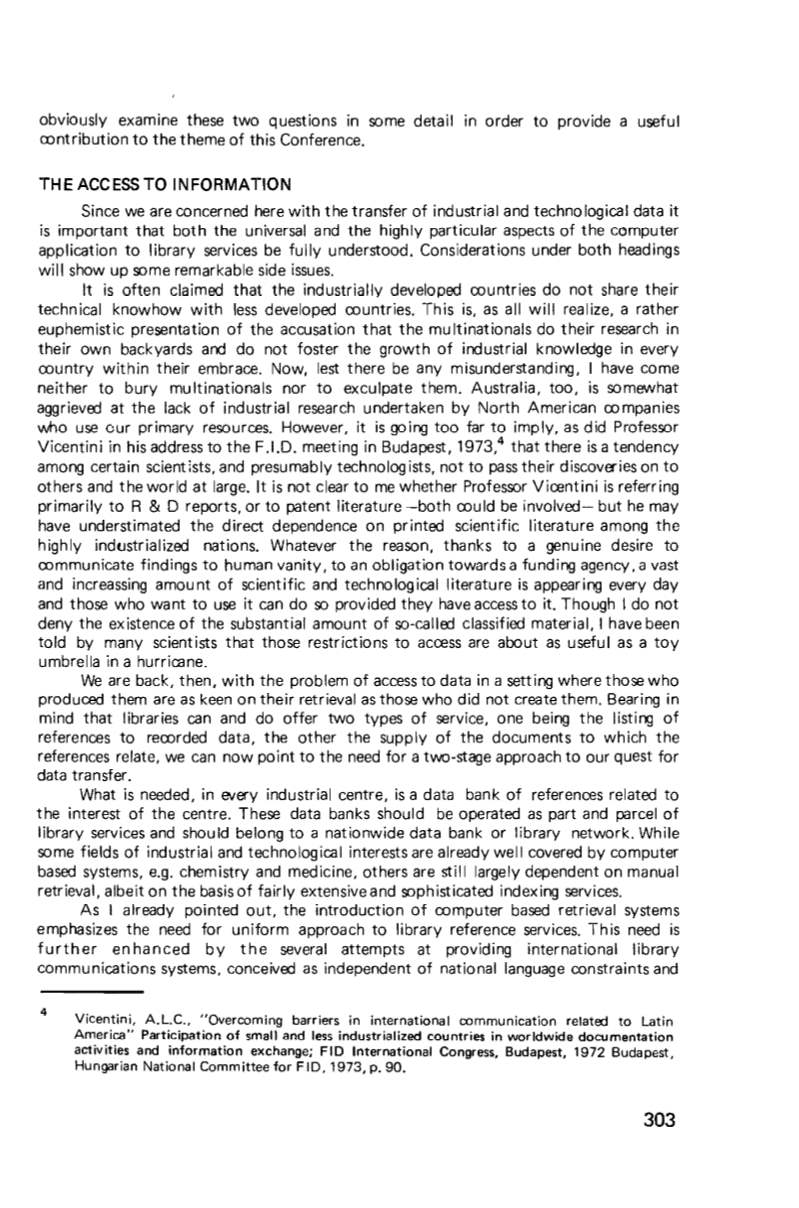
obviously examine these two questions in some detail in order to provide a useful
contribution to the theme of this Conference.
THE ACCESS TO INFORMATION
Since we are concerned here with the transfer of industrial and technological data it
is important that both the universal and the highly particular aspects of the computer
application to library services be fully understood. Considerations under both headings
will show up some remarkable side issues.
It is often c1aimed that the industrially developed countries do not share their
technical knowhow with less developed countries. This is, as all will realize, a rather
euphemistic presentation of the accusation that the multinationals do their research in
their own backyards and do not foster the growth of industrial knowledge in every
country within their embrace. Now, lest there be any misunderstanding, I have come
neither to bury multinationals nor to exculpate them. Australia, too, is somewhat
aggrieved at the lack of industrial research undertaken by North American companies
who use cur primary resou rces. However, it is going too far to imply, as did Professor
Vicentini in his address to the F.I.D. meeting in Budapest, 1973,4 that there is a tendency
among certain scient;sts, and presumably technologists, not to pass their discoveries on to
others and the world at large. It is not clear to me whether Professor Vicentini is referring
primarily to R
&
D reports, or to patent literature
~both
could be
involved~
but he may
have understimated the direct dependence on printed scientific literature among the
highly industrialized nations. Whatever the reason, thanks to a genuine desire to
communicate findings to human vanity, to an obligation towards a funding agency, a vast
and increassing amou nt of scientific and technological literature is appearing every day
and those who want to use it can do so provided they have access to lt. Though Ido not
deny the existence of the substantial amount of so-called classified material, I have been
told by many scientists that those restrictions to access are about as useful as a toy
umbrella in a hurricane.
We are back, then, with the problem of access to data in a setting where those who
produced them are as keen on their retrieval as those who did not create them. Bearing in
mind that libraries can and do offer two types of service, one being the listing of
references to recorded data, the other the supply of the documents to whích the
references relate, we can now point to the need for a two-stage approach to our quest for
data transfer.
What is needed, in every industrial centre, is a data bank of references related to
the interest of the centre. These data banks should be operated as part and parcel of
library services and should belong to a nationwide data bank or library network. While
some fields of industrial and technological interests are already well covered by computer
based systems, e.g. chemistry and medicine, others are still largely dependent on manual
retr ievaI, albeit on the basisof fairly extensiveand sophisticated indexing services.
As I already pointed out, the introduction of computer based retrieval systems
emphasizes the need for uniform approach to library reference services. This need is
further enhanced by the several attempts at providing international library
communications systems, conceived as independent of national language constraints and
4
Vícentiní, A.L.C., "Overcoming barriers in international communication related to Latín
America" Participation of smal1 and less industrialized countries in worldwide documentation
activities and information exchange; FID International Congress, Budapest, 1972 Budapest,
Hungarian National Committee for FID, 1973, p. 90.
303


